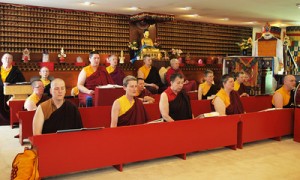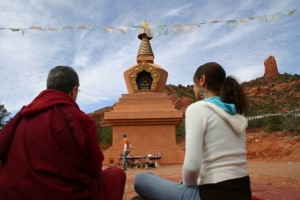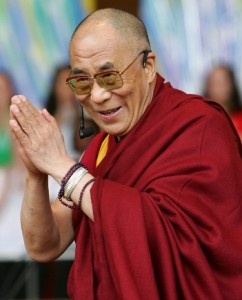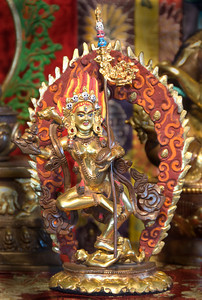An excerpt from a teaching by Jetsunma Ahkon Lhamo from the Vow of Love Series
The idea of renunciation is not popular in our country because we don’t understand it. In America we believe in accumulation; that’s our source of refuge: we accumulate. The minute we have that coffee pot and that microwave and that big- screen TV and all those different things, we’re going to be happy. If you don’t have a car, if you’re not rich, if you don’t have a toaster, if you don’t have a dishwasher, if you don’t have all of these things, that is the cause of suffering. Yet the Buddha says, “No, that’s not the case. The cause of suffering is the desire for those things.” Having devoted ourselves to accumulation, it becomes uncomfortable to think that we might have to dedicate our lives to renunciation.
It depends on your objects of refuge. If you really think that the coffee percolator, the TV, the anti-aging cream, the microwave, the big car and all the money are your source of refuge, then most Americans are practicing their religion correctly. But if you believe that enlightenment is the end of suffering, then that is your object of refuge. All the teachings and the supports to the Path to enlightenment – the Buddha, the Dharma or the Buddha’s teaching, and the Sangha or the Buddha’s community – are the objects of refuge. That is what you see as the solution. The things like toaster, can only make toast. The things like coffee pot can only make coffee. The things like TV can only show whatever they show. They are not sources of refuge; they never, ever, end suffering for more than a short period of time. If we understand that our sources of refuge are those things which end suffering, we’ll be able to perceive in a logical and real way.
We are a hard-working people. We get up very early in the morning. We quickly get ready under stressful conditions, putting on as much of those Estee Lauder things as we possibly can, before seven o’clock. Then we leave and stay on the road for a very long time, under terrible conditions. Then we get somewhere and we work very hard with people we don’t know very well, doing very strange things that are very different from our nature, all day long. Then we come home on a very long road that is also very difficult to travel. Then we eat very quickly, and don’t feel very well, watch TV and go to bed. That’s what most of our culture does. And it’s a very hard road.
We use so much energy doing things that we are told we must do. We must have a certain level of education. We must have a certain level of accumulation. We must care for these things that we have accumulated. We must cultivate certain kinds of relationships. That’s a big job. According to our culture there are certain lines that we have to cross in order to be successful and happy. We work very hard at these things.
But chronically and repeatedly at certain ages of our lives we go through phases or passages when we are dissatisfied. Marriages go through the seven-year itch. We go through middle age and we go through menopause. We go through all these different stages, and they’re so common and usual that our psychologists are beginning to recognize and document them and consider some of them normal.
What are they really? We work very hard to get to a certain phase of our life and then we find that it’s basically empty. We didn’t get the satisfaction we were promised. Then we gear ourselves up for another phase. When we get there, suddenly we find: uh oh. That’s not to say we don’t have our little joys and happiness’s along the way. But basically as a people we work very hard and yet are becoming deeply disappointed and disillusioned.
The way that some of us have chosen to deal with it is to think more positively and convince ourselves that we really are happy. We go to friends or support groups or some New Age groups or a psychologist; all the different avenues that people explore when they’re really hurting. What you basically come out with is, “Oh you have to change your thinking around.” You are told to think, “My life is full, my life is fruitful, I am really happy and I like being busy like this because it means that I’m having many experiences.” There are so many people doing that kind of thing it’s painful to watch. Some people are okay with that; it’s their karma to live a good and simple life, and throughout their life they try to be kind to others. But some people are really struggling.
Copyright © Jetsunma Ahkon Lhamo. All rights reserved




